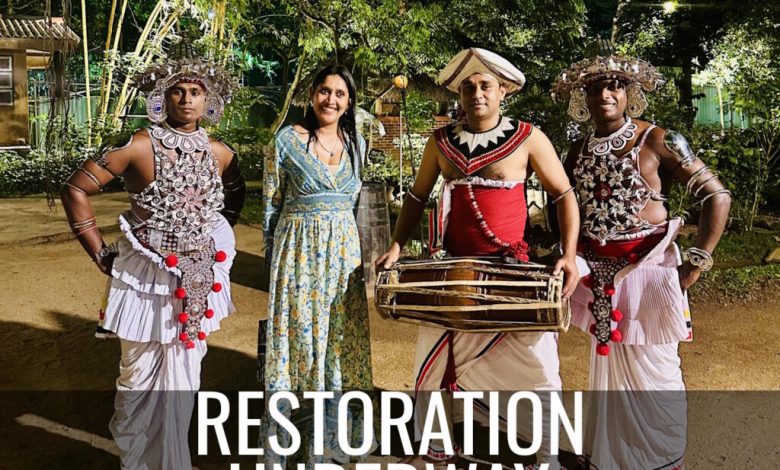

Can culture bundled into tourism products retain its ‘authentic’ credentials and deliver heritage value to host communities and visitors?
UK-based tourism educator Ashika Kalubadanage reckons so as she reconnects with her own ancestral heritage in Sri Lanka.
Thanks to “Good Tourism” Insight Partner Tourism’s Horizon: Travel for the Millions for inviting Dr Ashika Kalubadanage to write this “Good Tourism” Insight. (You can too.)
The devil dance unveiled
In recent years, the concept of regenerative hospitality has gained momentum. Regenerative hospitality focuses on sustainability with an emphasis on the restoration and celebration of local tourism ‘assets’, including culture and heritage.


This is especially relevant in destinations like Sri Lanka, where cultural traditions are deeply rooted but were, for some time, fading from public view. Thanks to contributions made by regenerative hospitality, cultural dancing, music, traditional food, and village lifestyles are no longer hidden in Sri Lanka.
As a child in Sri Lanka, I never saw a devil dance. It was traditionally performed only in private rituals. During my last two visits, however, I was deeply moved to see these once-hidden performances now embraced and shared with travellers. The hospitality industry, through hotels, restaurants, and tourism providers, is helping to preserve and promote the devil dance and other cultural practices.
Thanks to the growth of cultural tourism, today’s travellers seek more than just luxury; they are looking for authentic and meaningful experiences. Personally, even when I travel to other countries, I always look for traditional food, how it’s eaten, and cultural performances like music and dance.
In response to this shift in traveller preferences, hospitality and tourism businesses in Sri Lanka are embracing their cultural roots to not only attract guests but also revive and strengthen local identities. This aligns with the broader goals of sustainable and regenerative tourism: to contribute positively to local communities and ecosystems rather than deplete them (UNWTO, 2020).
Contents ^
Cooking with communities
One of the most memorable experiences during my recent visit to Sri Lanka was witnessing the growing trend of authentic culinary tourism, led by local women in village communities. This is more than just a food trend; it’s a meaningful shift that reflects the principles of regenerative hospitality, where tourism actively benefits the community and preserves cultural traditions.


My tuk-tuk driver asked if I would like to visit a nearby fishing village, buy fresh fish, and prepare lunch with a local village woman. He explained that this type of immersive experience has become popular among tourists, particularly in the southern regions.
Rather than dining at a hotel restaurant, many guests now choose to take part in a cooking session, selecting fresh vegetables from the hotel’s organic farm and preparing a meal alongside a village woman who shares not only her recipes but also her stories. These cooking sessions often use traditional firewood stoves and clay pots, methods rarely seen outside of rural homes.
What made the experience especially powerful was the storytelling. As she cooked, the host explained the cultural meanings behind the dishes, sharing memories and traditions passed down through generations. Without realising it, we were becoming part of a living cultural archive, one meal at a time.
This type of experience exemplifies what regenerative hospitality aims to achieve: creating opportunities that restore local knowledge systems, foster cultural pride, and empower communities economically and socially (Cole & Morgan, 2010). It’s not just about what’s on the plate, but the people, places, and histories behind it.
Contents ^
Cultural performances keep traditions alive
As I mentioned earlier, cultural dances in Sri Lanka were not commonly seen in public spaces when I was a child. These performances, particularly the devil dances, Thovil, which vary across regions and feature distinct costumes, were traditionally reserved for ritualistic or ceremonial events and rarely made accessible to wider audiences.
Today, however, there has been a noticeable revival of these traditions, especially within the hospitality sector. Many hotels across Sri Lanka now welcome their guests with traditional dance performances, some even including elements of ritualistic practice as part of the experience. Evening entertainment during dinner often features cultural music and dance, offering tourists an engaging and immersive glimpse into Sri Lanka’s heritage.
Read more “Good Tourism” in Sri Lanka
Importantly, these performances are not only for tourists; they also serve as an opportunity for younger generations of Sri Lankans to witness and reconnect with their cultural heritage. When families dine at these venues or attend special events, children and young adults are exposed to traditional art forms that might otherwise be at risk of fading away.
Again, as with community culinary experiences, cultural performances closely align with the values of regenerative hospitality, where the goal is not only to provide enriching guest experiences but also to restore pride in local traditions and ensure their continuity (Higgins-Desbiolles, 2018).
Furthermore, rather than being passive observers, visitors are invited to participate in storytelling through music and movement, an experience that fosters a deeper appreciation of culture.
Contents ^
My culture is alive again thanks to regenerative hospitality
We often talk about sustainability, but what if we took it a step further? What if travel could give more than it takes?
The shift towards slower and more experiential travel has encouraged the hospitality industry to partner with cultural regeneration movements. This has created economic opportunities for both, especially where traditions like food and dance are deeply rooted in families and communities. And one of the most powerful benefits has been inspiring younger generations to value and embrace their cultural identity.
So, the next time you travel, seek out moments in which food tells a story, when music connects you to the land and people, and where culture is not merely on display, but is alive in the hearts of those who are keen to share it with you.
A heartfelt thank you from me to the hospitality industry in Sri Lanka for bringing my cultural heritage back to life for me.
Contents ^
What do you think?
Share your own thoughts in a comment below on regenerative practices in tourism and hospitality, particularly where they interact with culture and heritage.
(SIGN IN or REGISTER first. After signing in you will need to refresh this page to see the comments section.)
Or write a “GT” Insight or “GT” Insight Bite of your own. The “Good Tourism” Blog welcomes diversity of opinion and perspective about travel & tourism, because travel & tourism is everyone’s business.
“GT” doesn’t judge. “GT” publishes. “GT” is where free thought travels.
If you think the tourism media landscape is better with “GT” in it, then please …
Contents ^
About the author


Ashika Kalubadanage is course director of the MSc Tourism, Hospitality and Events at Christ Church Business School, Canterbury Christ Church University, Kent, England.
Contents ^
Featured image (top of post)
The author Dr Ashika Kalubadanage flanked by Sri Lankan cultural performers. This pic and all others used in this post are used by permission and subject to copyright.
Top ^





